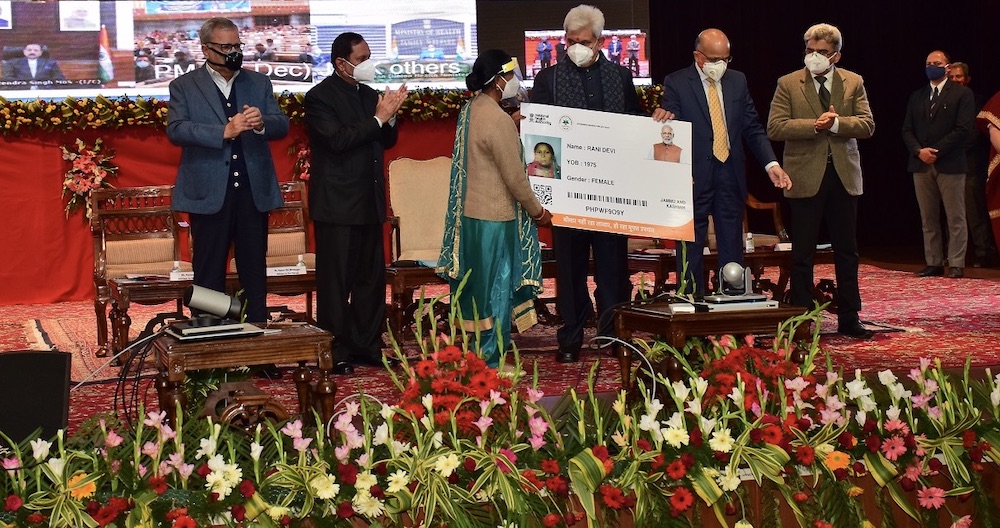by Syed Shadab Ali Gillani
SRINAGAR: The abrupt termination of the contract between IFFCO-TOKIO General Insurance Company and the State Health Agency (SHA) of the Jammu and Kashmir government has thrown the Ayushman Bharat Pradhan Mantri Jan Arogya Yojana (AB-PMJAY) into disarray. The insurance company terminated its three-year contract a year early, raising concerns about the impact on patients and healthcare providers.

Chief Executive Officer (CEO), of State Health Agency, Jammu and Kashmir Sanjiv M Gadkar (IAS), said that the contract is still there and that the news regarding the termination of the contract between IFFCO-TOKIO General Insurance Company and SHA is not true. “The contract is valid until March 2025, and the company will function as per the contract,” he asserted. SHA officials said the patient care will not be affected.
However, insurer sources suggest they are out of the contract.
The exit of IFFCO-TOKIO has left 239 empanelled hospitals in a precarious situation, as the SHA has not initiated a new tendering process for a replacement insurance company. Hospital managers express concerns over potential delays in claims processing and subsequent payments, which could have severe consequences for healthcare services in the region.
Despite the termination, SHA officials assert that patient care and payments to empanelled hospitals will not be affected. The SHA even sought legal recourse, filing a petition in the Jammu and Kashmir High Court against IFFCO-TOKIO’s decision. However, the court dismissed the petition, stating it lacked merit under Section 9 of the Arbitration and Conciliation Act, 1996.
The termination of the contract has financial implications for patients availing benefits under AB-PMJAY, commonly known as the Golden Card scheme. The scheme, which provides health insurance coverage to residents of Jammu and Kashmir, is now at risk of facing disruptions due to the lack of a replacement insurance provider.
Adding to the complexity, the government is contemplating continuing the scheme in “trust mode” with amendments, following the exit of IFFCO-TOKIO. Sources, however, suggest there could be significant changes to the scheme, such as the removal of four common surgeries (Gallbladder, Hemorrhoids, Fissure in Ano, and appendicitis) from the list of free surgeries. These four surgeries, insiders suggest contribute to 58 per cent of the total surgeries done in hospitals in addition to gynaecological procedures through the Golden Cards.
Private hospitals seem to welcome the move, anticipating faster payments without the risk of rejections and deductions. On the contrary, this decision could result in increased financial burdens on patients, as they may now have to pay for these surgeries in private facilities or face extended waiting times in government hospitals.
Moreover, criticism is mounting against the government’s decision to reduce the package rates by 10 per cent, adversely affecting the quality of healthcare in Jammu and Kashmir. Healthcare professionals argue that the rates should have been increased, considering the inflation index over the past three years.
The reduction in rates is particularly alarming for critically managed dialysis procedures, with rates decreasing from Rs 1400 to Rs 1000 in public hospitals. Healthcare providers express concerns that such reductions may compromise the effectiveness of the scheme, potentially impacting patient outcomes.
As the government weighs the options of re-tendering for a new insurance company or establishing its own trust to run the scheme, the fate of AB-PMJAY remains uncertain. There is no crisis right now but nobody knows what is going to be the next.
In Jammu and Kashmir, the Ayushman Bharat-PMJAY-Sehat initiative has achieved significant milestones, with over 92 per cent of beneficiaries, totalling approximately 77 lakh people, receiving ‘golden cards’ through the program. SHA data suggests it has issued 8210171 Golden Cards involving 9717471 beneficiaries across Jammu and Kashmir. So far, 1046853 claims have been made through 239 hospitals empanelled under the scheme.
Last year, the State Health Agency earned recognition as the ‘best performing’ entity in categories such as gender equality, enrollment under PMJAY Ayushman Bharat, the highest number of Ayushman cards issued, and the full utilisation of allocated funds.















